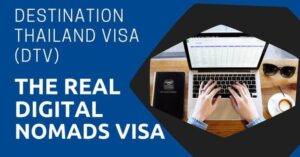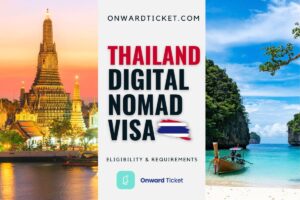Thailand has always been one of the most popular destinations of digital nomads being characterized by the rich culture, low cost of living, stunning beauty of nature and pleasant climate. As more remote professionals are settling in Thailand, cities, in particular Chiang Mai, Bangkok, and Phuket, have become digital nomad hotspots. Many nomads can sustain themselves by carrying out online work with foreign clients, but some want part-time employment so that they can use their money, meet (local) people, or discover other ways to work. Even though the local work laws might be restrictive, legal part-time roles continue to exist and be available to digital nomads who read the country regulations, keep an open mind and are creative about their approach to the seeking of the work.

The Legal Environment of the Foreign Workers
Digital nomads cannot jump into the world of part-time jobs in Thailand without first getting familiar with the work permit conditions and visa stipulations in the country. Employment in Thailand without proper permit is unlawful whether the position is part-time job, freelancer or voluntary one. Thailand government is keeping high antennas of the foreigners who work without proper documents and reimbursement can undergo heavy fines, deportation and even become blacklisted.
Normally, digital nomads remain in Thailand with the help of their tourist visa, educational visa, or some special long-term visa such as the Thai Elite Visa. Nonetheless, these do not allow employment in the region. Contrarily, to employ an employer in Thailand, one has to possess a Non-Immigrant B visa and a work permit to be within the law.
Co-Working spaces offer freelancing and Remote Gigs
The infrastructure in Thailand is very conducive to digital working, and the ecosystem is attractive in most cities as it features a large amount of co-working offices, technology social gatherings, and startup accelerators. The hubs do more than provide dependable internet and work productivity, they are a place that can open their members potential freelance projects or work partners.
Freelancing is still one of the most realistic sources of income of digital nomads in Thailand. Arts who are good at web development, graphics design, online marketing, copywriting, and advisory can also find jobs on global markets such as Up work, Freelancer, or Fiverr. Other nomads can relate with local enterprises, which require digital transformation, the case could be hotels that required enhancement of their websites, restaurants that required assistance in social media marketing, tour firms to gain better online exposure among other things. Although legally such an instance of local freelancing remains a gray area, nonetheless, people continue to do this type of work and keep it under the radar, surviving mostly on international clients.
Photography, Videography and Art: Creative Work
Thailand has beautiful sceneries, street life, and festivals which are suitable material to creative minds. Photographers or videographers who are digital nomads tend to enroll in part-time contracts such as shooting weddings, or creating promotional videos of local organizations. The operators of tourism, yoga resorts and small size hotels constantly require visual assets and can afford to employ talented creators in a freelance or project-based manner.
Respectively, artists, illustrators, and designers may get temporary employment, painting murals, teaching workshops, or selling art pieces in local markets and pop-up galleries. Specifically, Chiang Mai boasts not only a vibrant art culture but open-minded local and expat cultures as well that are open to creative partnerships. These activities might not turn out as profitable every time but they can give a nomad more visibility and give ways to have unusual experiences.

Roles in Tourism and Hospitality
Though foreign labor in Thai tourism sector is severely restricted, there are certain exceptions to part-time or freelance work opportunities which are more oriented towards the content creation or the design of an experience instead of the conventional customer service work. As an example, some digital nomads collaborate with tour companies to create their experiences of foreign tourists, advice in the development of better services to international audiences, or offer English-speaking assistance on the web content.
In others, they can participate part-time in yoga retreats, wellness facilities or holistic resorts. These functions usually involve activities such as taking on marketing work, being a yoga or fitness instructor, maintaining social media, or dealing with guests.
Tech Startups and Digital Solution Service
A number of expanding technological startups and digital marketing agencies in Bangkok and Chiang Mai appreciate global insights and experience in the usage of English. Other startups recruit freelancers or work at home employees to develop the content, UX and UI design, online strategy, and customer service. Though networking and actually showing up to co-working centers or meetups is frequently a necessary tool to land such positions, they can be very stable and allow more professional growth than being a freelancer.
Nomads who can show some special talent or accomplishments are especially welcome at startups. Since these companies are start-ups, they can be offered on an unpaid internship basis or test collaboration basis which can later be turned into paid part-time opportunities.
Exchange and Volunteering
Although becoming a volunteer is not the same as getting a job, it is a valuable means of digital nomads to contribute to the locals and, in some cases, benefit indirectly by getting offered free places to stay in or food. The assignment of volunteering in Thailand can be in Animal sanctuaries, orphanages, volunteering in language education of rural schools or even organic farms.
Such websites as Work away, help, and World packers have dozens of host organizations in Thailand seeking temporary assistance. Although such exchanges do not offer salaries, they do allow the living expenses to go down considerably as well as provide the immersion that serves to improve the level of familiarity with the Thai culture. It should be mentioned, though, that volunteer work is not always outside of labor laws, so it is better to understand that the host organization is sound and informed about the scope of such a scheme according to Thai laws.
Coaching and online tutoring
Online teaching is one of the best choices of people who possess specialized knowledge or have experience in coaching. A lot of nomads use such websites as Preply or iTalki or Cambly to provide individual lessons in English, other languages, business skills or academic areas. In the same style, coaching a client who is in a different country could be done on zoom or Skype in domains such as business, career construction, working out or even mentality.
Given that such jobs are purely online and not linked to the Thai economy, they are compatible with local labor laws and thus are perfect semi-professional activities. Online tutoring is also flexible and scalable, which gives nomads the freedom to work according to the travel schedule, availability and need.

Conclusion:
There are many different part-time jobs available to the digital nomads in Thailand, and the integrative path is not without difficulties. Crossing borders, visas, work permits and the culture means research, responsibility and ingenuity. Although the safest and most sustainable model is work with foreign customers working online, there are cases of nomads that also earn supplementary finances with the help of legal jobs as an educator, with freelancer work, playing some creative role, or volunteering.
As the conclusion, the secret of success in becoming the digital nomad in Thailand is to stay informed, flexible, and understanding of the local legislation and traditions.